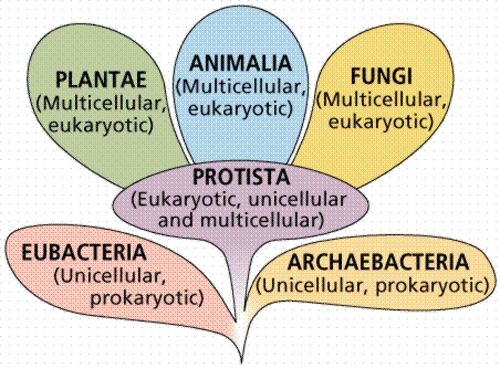The heterogeneous protists
 Protists (or protoctistes), not to be confused with the prokaryotes, are a diverse group of organisms and polyphyletic including those eukaryotes that are not considered in either animals or plants, or fungi.
Protists (or protoctistes), not to be confused with the prokaryotes, are a diverse group of organisms and polyphyletic including those eukaryotes that are not considered in either animals or plants, or fungi.
Haeckel proposed to include these organisms in the kingdom Protista or Protoctista, a group that now appears to be paraphyletic: organisms classified as such does not in fact have much in common aside from fairly simple organization (unicellular or multicellular without highly specialized tissues). So the kingdom of protists is a residual category, artificial, a kind of container for all the organisms can not be included in other realms. Currently, in the light of recent studies of molecular phylogeny, it is trying to give this category to follow more objective criteria.
Protists are the first and most important stage of evolution of eukaryotic organisms, produced dall'endosymbiosia between autotrophic and heterotrophic organisms prokaryotes (bacteria and cyanobacteria).
They are the basis of all biological evolution stage from which have developed all other living organisms, in what is their immeasurable importance in understanding the biology and evolution. In fact, unlike multicellular organisms, are made up of individual cells, but with characteristics by self and self-sufficient, with skill unknown to the cells of metazoans (multicellular organisms).
Protists were traditionally divided into several groups based on the similarity with animals or fungi: then protozoa, algae (or " protofite ") and "lower fungi".
These clusters can easily overlap (eg Chlamydomonas algae has been considered at times and sometimes a flagellate protozoan) .
Once the bacteria were also considered protists, in the system of three kingdoms Animalia (corresponding closely to the modern group, but included protozoa), Plantae (which included plants, algae and fungi), and Protista (everything else). Even before the advent of phylogenetic classifications, bacteria (which are prokaryotes) were placed separately, along with cyanobacteria ( the so-called " blue-green algae ").
Let's see now one by one.
1) Protozoa are mostly single-celled protists and furniture, which feed by phagocytosis, though there are numerous exceptions. Protozoa live both on land and in the water and there are also various parasites. Were usually grouped into four classes:
- Mastigophora with long flagella (eg Peranema);
- Sarcodina with pseudopodia, including radiolari (eg. Ameba);
- Sporozoa non-motile parasites and some can form spores (eg Toxoplasma);
- Ciliata lashes with multiple (eg Paramecium).
2) With the name of algae (plant-like protists) means many single-celled organisms that were also classified as protozoa, as many believe they have acquired chloroplasts through secondary un'endosymbiosis. Others are non-motile organisms, and some multicellular, including members of the following groups:
- Chlorophyta: green algae, similar to terrestrial plants (eg Ulva);
- Rhodophyta: Red algae (es. Porphyra);
- Other algae: brown algae, diatoms (eg Macrocystis).
The green and red algae, with a small group called glaucophytes, seem to be closely related to land plants and are therefore classified in the plant kingdom (Plantae or Archaeplastida) despite their very simple structure. Most of the algae, however, has developed separately. They include aptofite, the cryptophytes, dinoflagellates, the euglenofite and cloraracniofite, all of which were considered even protozoa.
3) Various organisms with a simple organization were considered as "mushrooms" because they produced spores. They were usually called "lower fungi". These include the slime molds, and the acrasiomicetes and chitrides. While chitrides are considered fungi to all effects, the other groups have been placed between the stramenophila (which have cell walls composed of cellulose) and in the Amoebozoa (which do not have cell walls).


 Protists (or protoctistes), not to be confused with the prokaryotes, are a diverse group of organisms and polyphyletic including those eukaryotes that are not considered in either animals or plants, or fungi.
Protists (or protoctistes), not to be confused with the prokaryotes, are a diverse group of organisms and polyphyletic including those eukaryotes that are not considered in either animals or plants, or fungi.
